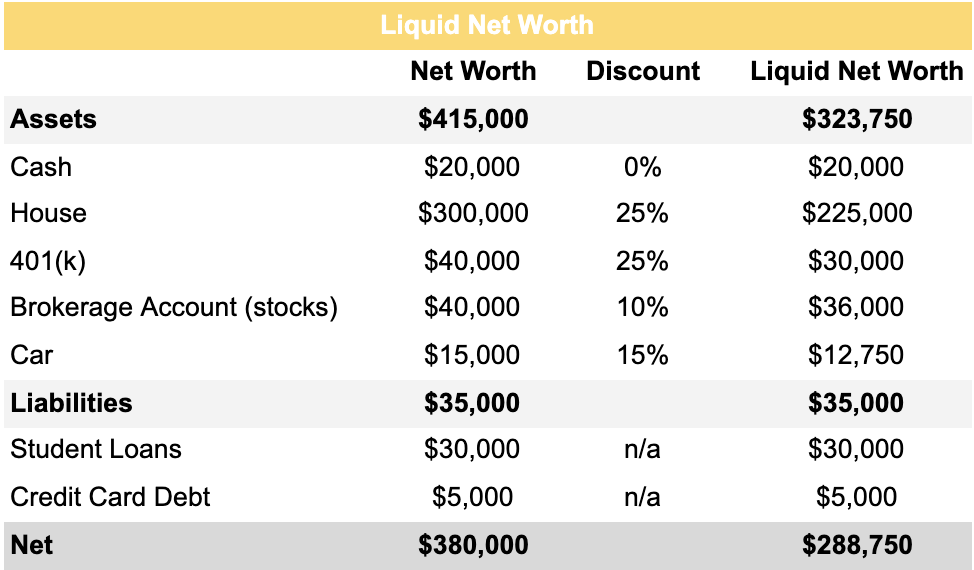What is Liquid Net Worth and How to Calculate Yours
Last Updated: April 29, 2022 • 12 min read
Disclosure: This page may contain affiliate links and we may receive a commission through them, but this is at no additional cost to you. For more information, please read our privacy policy.

It seems that everyone is interested in the net worth of athletes, celebrities, and business professionals. It is important to note that there is a big difference between regular old net worth and liquid net worth.
Elon Musk has a net worth of around $189 billion, which sounds like an absurd amount of money. The interesting thing is that doesn’t mean that Elon can go out and buy 189 billion dollars worth of jets, yachts, sports teams, or mansions.
His net worth is $189 billion, but his liquid net worth is a significantly smaller number.
To calculate Elon’s liquid net worth is no easy feat. His portfolio is mostly comprised of Tesla and SpaceX stock. The Tesla and SpaceX stock give him a massive net worth, but because it would be next to impossible to liquidate all of his Tesla and SpaceX stock at once, his liquid net worth is basically impossible to calculate. I guess we should all feel bad for Elon Musk.
The rest of us have it slightly easier to calculate our liquid net worth, and it is an important part of our personal finance journey to take it into account.
What is Net Worth and Liquid Net Worth?
Net Worth Definition
Net worth is your total assets minus your total liabilities. It is crucial to understand the normal net worth before we talk about liquid net worth.
To speak a bit more about net worth:
- Assets are basically anything of value that you own, stocks, cars, real estate, investments, and money are good examples
- Liabilities are things that you owe, student loans debt, credit card bills, car loans, lines of credit, and mortgages
If you subtract the value of everything that you owe (Liabilities) from the value of everything that you own (Assets) you can calculate your total net worth.
Liquid Net Worth Definition
Liquid net worth is the amount of net worth you could easily convert to cash if the need arose.
As a math problem, it would look like this:
Liquid net worth = liquid assets - liabilities
That looks fairly similar to calculating your overall net worth, but the key difference here is determining which of your assets are liquid.
How to Calculate Liquid Net Worth
The basics of calculating your total liquid net worth depend on being able to determine which of your assets are classified as liquid assets.
Liquid Assets
Liquid assets are cash and assets that could be turned into cash very quickly. This is also referred to as cash equivalents. Major liquid assets are:
- Bonds
- Stocks
- Cash
Basically, anything that you can turn into cash within a few days while keeping its full value (minus taxes of course) can be classified as a liquid asset.
Let’s dive deeper into three examples of liquid assets:
Cash
You can have cash in many different places. The easiest to think of is cold hard cash in your purse, wallet, pocket, or safe. You can even include the coins in your couch if you can find them!
Cash can also be saved in accounts and other locations, including:
- Money market accounts
- High yield savings accounts
- Savings accounts
- Checking accounts
Every bank account listed above you could liquidate your cash within a few minutes to a few days.
Equity in a Brokerage Account
Stocks, mutual funds, index funds, ETFs, and any other types of equity in a brokerage account are also included when counting up your liquid assets.
As you may know, when you liquidate anything in your brokerage account you will end up paying capital gains taxes. Which you will need to take into account when you are calculating your liquid assets. The nice thing is that when the stock market is trading you could liquidate these assets in a quick fashion.
Bonds in a Brokerage Account
Just like the equity example provided above any bond funds, bonds, and any other types of fixed income in your brokerage investment accounts are also included when calculating your liquid assets.
You will also get to pay capital gains taxes if you plan to liquidate your bonds, so make sure to also take that into account as well when you are counting up all of your liquid assets.
Non-Liquid Assets
Non-liquid assets can be classified as anything that cannot be turned into much cash quickly or for close to their full value.
A 401(k), Roth IRA, or other retirement accounts can be sold for cash fairly quickly, but you would end up getting charged a lot of early withdrawal penalties and that would affect the cash value of those assets.
If you were to sell your house, you pretty much know the value you would get out of it, but it usually takes months to completely sell your real estate which would make it one of many illiquid assets.
When you are valuing non-liquid assets there are two main schools of thought. You can either give them a liquid value of $0 or you can calculate a liquid value by just applying a discount percentage to their value. As you might have guessed, I prefer applying the discount.
A home that has a value of $100,000 probably does not have a liquid value of $0. If you apply a discount to non-liquid assets you can estimate their value in a truly liquid form, and it is a lot more realistic than just saying that they are worth nothing.
For the following listed major not-liquid asset classes I will include what I think is a good discount percentage:
Real Estate
I would have to say that most real estate is a non-liquid asset because of many reasons which include:
- It normally takes a while to sell real estate, even if you are selling at a steep discount
- Most every real estate transaction costs more than you think and has real estate agent commissions associated with them
- People usually try and negotiate the price of real estate, even though the price is normally well known
Real Estate Discount Percentage: 25%
Cars
Cars are included as non-liquid assets because they usually depreciate fairly quickly.
Cars can be sold much faster than real estate, but you will need to discount their value to be able to accurately determine their worth.
Vehicle / Car Discount Percentage: 15%
401(k) Assets
Your 401(k) assets can be liquidated and sold just as quickly as stocks and bonds. There is a caveat, you will have to pay an early withdrawal penalty of 10% if you withdraw any of the funds before retirement age.
The worst part about that penalty is that it is on top of any taxes that you will also owe.
401(k) Discount Percentage: 25%
IRA and Other Retirement Account Assets
Just like a 401(k), your retirement savings in an IRA (Traditional IRA or Roth) can be converted to cash very quickly if the market is open, but again you will face a withdrawal penalty if you take out any of the funds before your age of retirement.
The cool thing about the Roth IRA is that you can withdraw your contributions at any time without a penalty. This is contributions only, and not the added growth on top of them mind you. Your Roth IRA contributions are actually liquid assets and should not be included in the discount percentage below.
IRA Discount Percentage: 25%
Liquid Net Worth Example
Like I mentioned earlier, to calculate your liquid net worth all you do is subtract your current liabilities for your liquid assets.
The issue that we have here is that there are two ways to calculate the liquid value of your non-liquid assets. You can:
- Include them with a discount percentage
- Exclude them completely
I like to include my non-liquid assets with a discount percentage. You are more than welcome to use the discount percentages above or come up with your own.
Here is an example of how to calculate your liquid net worth. It also includes a comparison against a full net worth number:

Let’s walk through the Liquid Net Worth table real quick:
- Cash: The $20,000 in a savings account (or in a safe) has the same value when calculated as liquid net worth
- House: There are a lot of reasons that a house isn’t a liquid asset, and because of that it had a 25% discount applied against it
- 401(k): A 25% discount was applied against the entire value of the 401(k) account, which brought the total down to $30,000
- Brokerage Account: Because a brokerage account is a liquid asset, but you get to pay a 15% capital gains tax rate on the gains involved, there was a 10% discount applied against the total here
- Car: Because a car is not a liquid asset, a 15% discount was applied to it bringing the total down to $12,750
- Liabilities: When you are calculating liquid net worth liabilities do not change from a normal net worth calculation
In the example above the total net worth is approaching $400,000 while the liquid net worth with discounts applied is only $288,750.
Did you know? The median net worth in the United States is $121,700.
Why Does Liquid Net Worth Matter?
Liquid net worth is an accurate measure of how financially stable you are right now. It is very important to understand both types of net worth if you are trying to achieve financial freedom, and especially if you want to be prepared for future emergencies. If you are actively trying to become financially independent, your liquid net worth becomes even more important. This is what you will rely on to pay your bills. A huge 401(k) and a paid-off house are amazing accomplishments, however, if you want to retire early you will need to be able to fund your lifestyle. It’s pretty hard to pay for a sandwich with home equity.
Quick note: your liquid net worth also acts as a complete emergency fund. If you were to find yourself without a job tomorrow, or you had some major life expenses come up, your liquid net worth is what you would have to be able to cover yourself.
How to Increase Your Liquid Net Worth
If you want to increase your liquid net worth, you have multiple options. Here are four different tactics that are the most effective:
1. Lower Expenses
As we all know, lowering your expenses is a lot easier said than done. Honestly, that applies to all the tactics on this list. As you might have guessed, expenses are tied directly to our liabilities, and if we can lower our liabilities that will then increase our net worth.
A good place to start would be to keep recurring credit card debt extremely low, I recommend $0. Credit card debt has insanely high interest rates and can cause your liabilities to grow instead of shrink.
I would also recommend creating a budget. That has been extremely helpful for us to lower our expenses and keep our spending in check.
2. Increase Your Investments
Who would have thought that investing would be a great way to increase your net worth?
In an average year, investments usually go up in value. That can’t be a guarantee, but in the long run, they will most likely have a positive effect on your personal net worth and grow faster than if you were just holding onto the cash.
3. Increase Your Income
There are many ways that you can increase your personal income, but the two most likely are:
- Negotiate a better salary
- Start a side hustle
I personally like trying to increase my income instead of cutting costs. We have no upper limit on the amount of money that we can make, but there is a bottom limit of spending, which is $0.
4. Minimize Your Non-Liquid Assets
This is a tactic that I included but don’t really recommend. It does indeed increase your liquid net worth immediately.
If you put more money into cash and less money into investments like real estate, 401(k), IRAs, and other current assets that are less liquid it will increase your liquid net worth immediately. This has a tradeoff for your future overall financial situation, as the easiest way to get a larger net worth is through investing instead of hoarding your cash like Scrooge McDuck.
Last Thoughts on Liquid Net Worth
Your liquid net worth is the true measure of your financial health.
It indicates how prepared you are to handle an emergency that comes your way, and it tells you how close you are to achieving financial independence.
If you are in control of your liquid net worth, you are making a huge step in the right direction to ensure your financial security.
If you aren't tracking your net worth yet, make sure to check out Empower.
